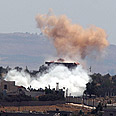
The likelihood that Syrian President Bashar Assad would make use of chemical warfare or hand such weapons over to Hezbollah has diminished significantly in recent days, according to a top official in Jerusalem.
Citing data from Western intelligence agencies, the official said that the Syrian regime does not intend to employ the chemical weapons in its possession. Moreover, it is taking great care to make sure that the arsenal doesn't fall into the hands of any group outside the Syrian army.
Related articles:
- IDF chief: Attack in Syria may lead to broader conflict
-
Syria: Chemical weapons only for foreign attack
-
Barak: Israel may seize advanced weapons in Syria
Intelligence agencies in the United States, Europe and the Middle East have learned recently that Syria has been transferring the materials used to produce the chemical warheads to bases located far from the sites of the battle between government and opposition forces. The resources are being relocated to bases in the country's east, to which the rebels and Hezbollah have scarce access.
The authorities are also careful to separate the different materials that go into nerve gas, and store them in bunkers and camps that are located dozens of kilometers away from each other. Therefore, if insurgents do get their hands on some of the chemicals, they won't be able to compound the ruinous gas.
Syria has produced large quantities of chemical warfare agents, and is also in possession of large stockpiles of mustard gas, which were evidently handed over to Syria by Iraq in 2003.
Heeding West's warnings
Last week, the Syrian opposition has voiced concern that the Syrian army has begun using these chemical weapons against the rebels. Around the same time, Western intelligence officials have spotted the movement of trucks and logistics units near the bases in the Wadi Khaled region and in the cities of Homs, Hama and al-Safir. The officials postulated that the embattled regime intends to use the chemical agents against opposition forces.
The US was quick to publically warn Syria against using the agents, a sentiment later reiterated by UN Secretary General Ban Ki-Moon. Less vocally, Russia has urged Assad not to employ the weapons in his arsenal as well.
Israel, in turn, has cautioned Syria not to hand over the chemical agents to Hezbollah; Jerusalem primarily fears that the militant group will take advantage of the chaos in Syria to seize the chemicals even without Damascus' consent.
Evidently, Damascus has taken these admonitions to heart, taking meticulous measures to protect its chemical arsenal.
Syrian Foreign Ministry spokesman Jihad Makdissi's announcement that the country's chemical weapons stocks are secure and would only be used in the case of a foreign attack was meant to signal the West that the warnings have been heeded.
Over the weekend, Defense Minister Ehud Barak said that Israel is preparing for a possible military intervention in Syria in case Damascus hands missiles or chemical weapons to Hezbollah. On Tuesday, IDF Chief of Staff Lieutenant General Benny Gantz warned, however, that a strike on Syria's chemical weapon caches could implicate the Jewish state in a major war.
- Receive Ynetnews updates
directly to your desktop















